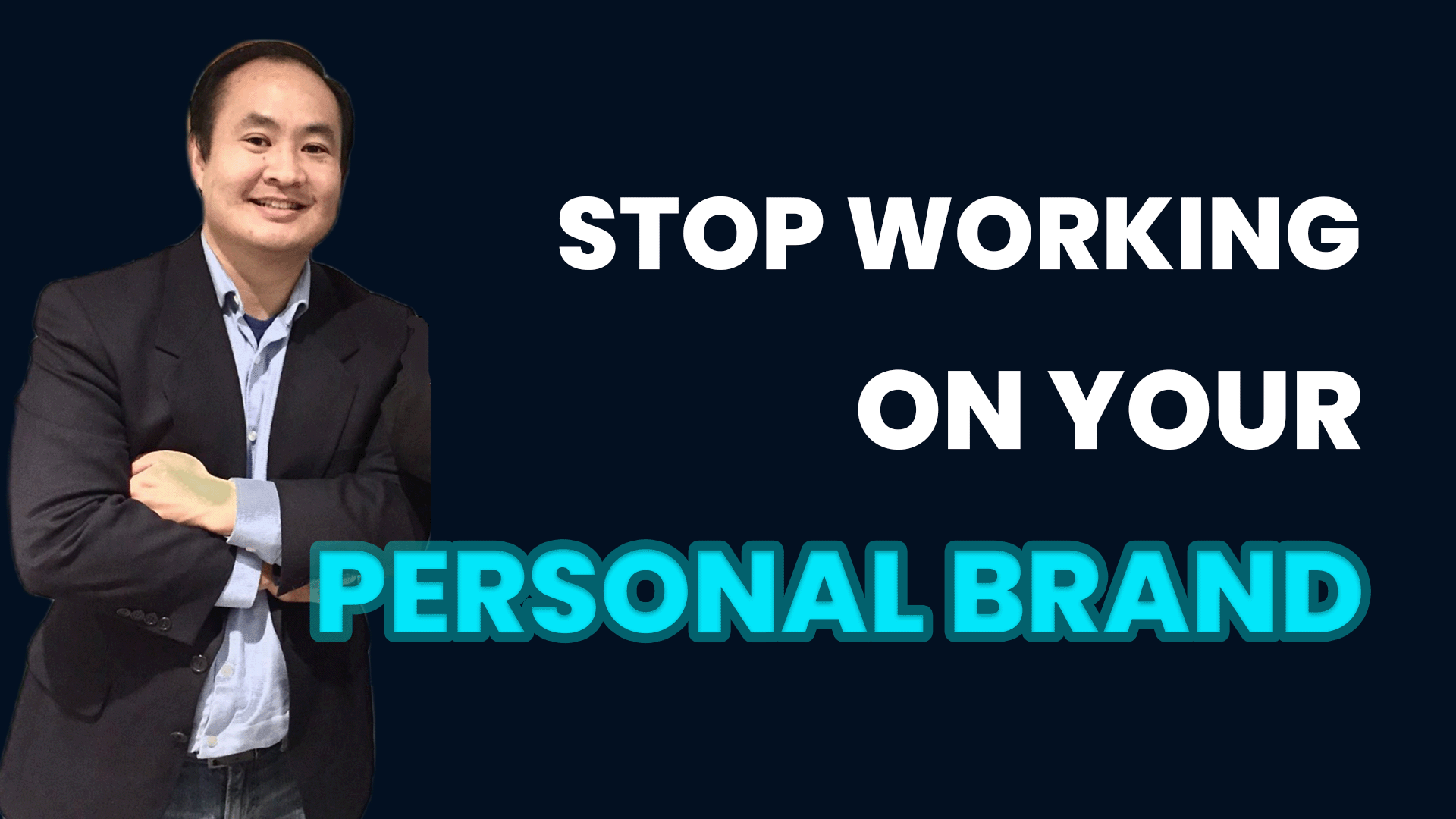
We’ve had some VAs attempt to work on my personal brand. These are great VAs, well-meaning and trained, with some digital marketing experience. However, they’ve struggled with my personal brand.
They don’t know the details in our personal brand manager document, the key people involved, the terminology, or the concepts. They don’t even follow me on Facebook. It’s not that they’re bad people; they just lack the necessary understanding to represent my personal brand effectively.
My personal brand, like others, has a lot of content. We’ve collected and processed this content through the Four Stages of Content Factory over the years. Much of this work has been done by me, as we practice, learn, do, and teach.
If I tell others it takes 15 minutes to process a raw video and post it to a webpage, I should have done that myself many times. I can’t assign tasks I’ve never done before. If I’m going to advise on speaking on TV or at a conference, I need to have that experience.
Personal Branding is Largely About Your Network
Your network produces content organized by your expertise. This content can be categorized into different topics. The idea of a Topic Wheel allows us to align your network (who you know) with your expertise (what you know).
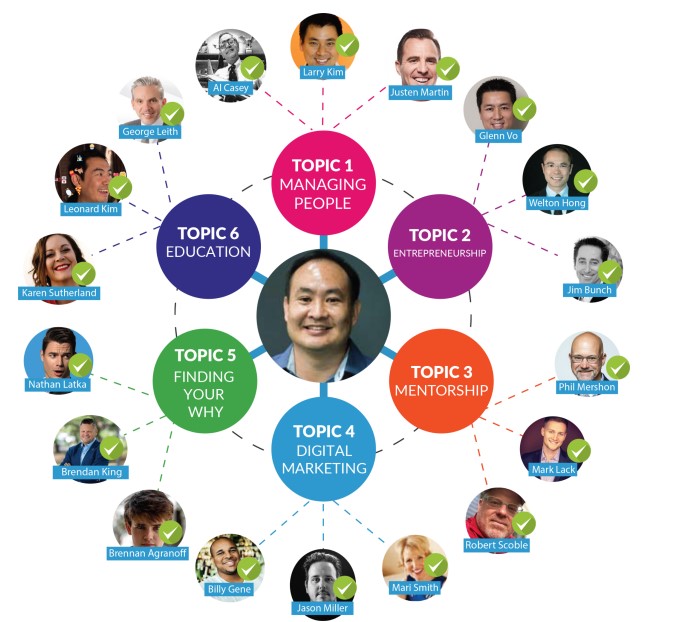
Some people start from the inside out, focusing on topics they care about and then associating them with people. Others, especially extroverts, might start with the people they know and map that to their expertise. Whether you start inside out or outside in, this is how you establish a strong personal brand.
Your personal brand isn’t just what you say about yourself—it’s what others say about you, whether co-created or not, across various channels. Even if you produce a hundred pieces of content per day, you can’t outperform what your network can do for you.
Many think building a personal brand means constantly talking about their accomplishments. But people generally care more about themselves and their families than about what you do.
I interviewed Michael Stelzner, founder of Social Media Marketing World. He emphasized the importance of others vouching for you. Collecting and sharing endorsements from credible sources like Michael Stelzner adds more credibility than what you might say about yourself.
So there are three or four reasons why you shouldn’t work on your own personal brand.
One is if you talk about yourself, you’re a douchebag.
Secondly, there’s a lot of work in processing content as part of the content factory that isn’t worth your time. In the four stages of the content factory, your highest value is in producing content, focusing on relationships, and traveling. The processing should be done by a VA. If you don’t have a VA, then you end up doing it yourself. Publishing can also be handled by someone else, but if they write under your name, they must avoid grammatical errors, understand the key people in your network, grasp important themes, and know your audience well.
They need to understand your goals, content, and targeting. For instance, our goal is to create a million jobs. The content includes all the training to achieve that goal, and the target is anyone wanting to participate in this ecosystem, either by getting a job or hiring a trained VA.
If someone doesn’t understand the structure of your personal brand, they can’t effectively work on it. They might be skilled at Photoshop or video editing with Premiere Pro, but that’s not enough.
The common problem I’ve seen is that people hire a VA, hand them a folder of speaking engagements, articles, and archives, and then wonder why the VA starts mindlessly editing and applying templates. The VA doesn’t know who you are, what you care about, or what your mission is, which causes obvious problems.
It’s a violation of learn do teach. You can’t teach someone something you haven’t done yourself many times, but even in our company today, and in your companies as well we see the same issue. So I could look at my friend, John Jonas.
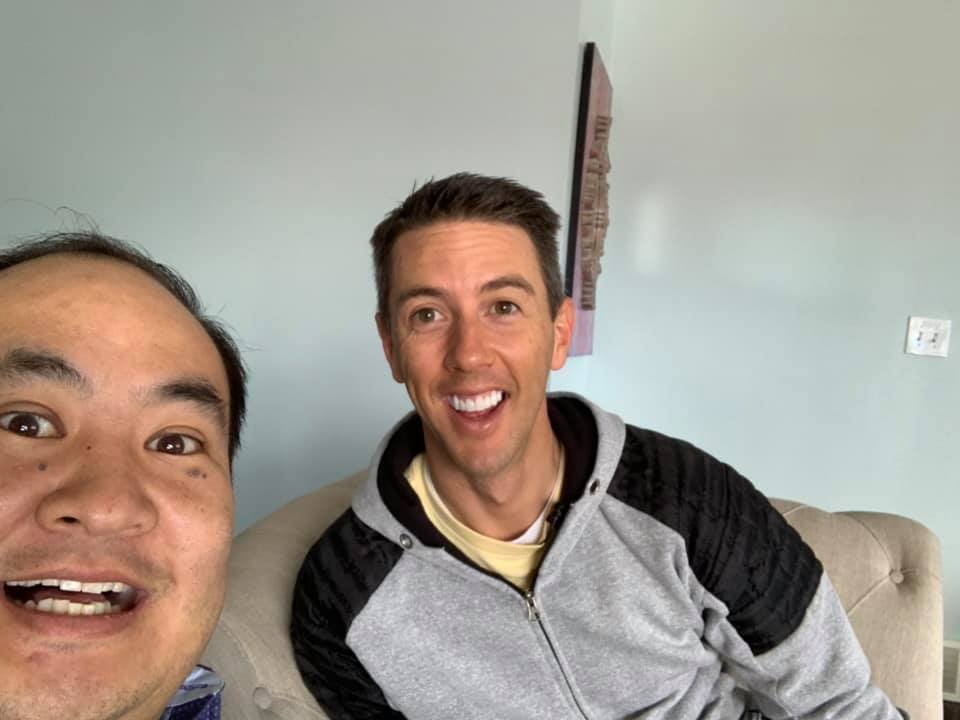
We discussed various topics, including VAs. John Jonas, the founder of onlinejobs.ph, is a credible authority on VAs, having hired many over the years and with 2 million VAs on his platform.
I also know a lot about VAs because of our extensive training programs. To increase my authority in a specific area, like hiring in the Philippines, John Jonas is the go-to expert. Similarly, while I’ve spent a billion dollars on PPC, Larry Kim is an expert I can reference to enhance credibility.
This isn’t name-dropping but an intentional strategy. For example, Larry Kim and I collaborated on Clubhouse. I helped him grow his following by opening rooms and inviting him to join, ensuring he was visible and acknowledged.
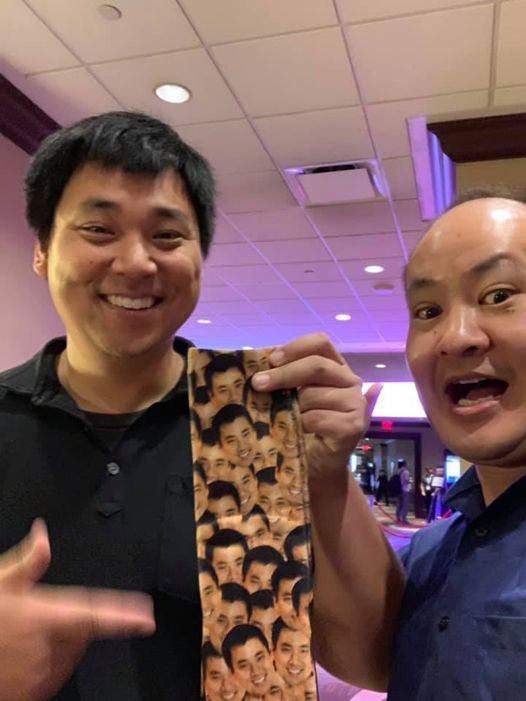
That’s pretty nice. Now, who’s building whose brand here? Because we’re talking about why you shouldn’t work on your own personal brand.
Why Is It Better to Give Larry a Pair of Larry Socks?
Because people care about themselves, and you always want to meet them where they are. So I’ve interviewed him. He’s interviewed me. We’ve spoken at lots of conferences together. He even won the PPC market of the year. He’s the founder of WordStream. He has 2 per cent of Google’s global ad spend.
That’s pretty good. So, he carries some authority when it comes to online marketing, which is an understatement, and Larry and I have done all kinds of stuff over the years. I’m not saying this to boast. By being with Larry and elevating Larry that grows my personal brand.
So, if it’s true, I want to reach universities, right? We have a program for current college students and professors to start agencies. Karen and I are talking about how we’ve done that at the University of Louisville and at lots of other universities.
Who carries more authority? Me saying this? I run an agency. I know a lot about this agency stuff. Look, I even took Karen to Facebook.
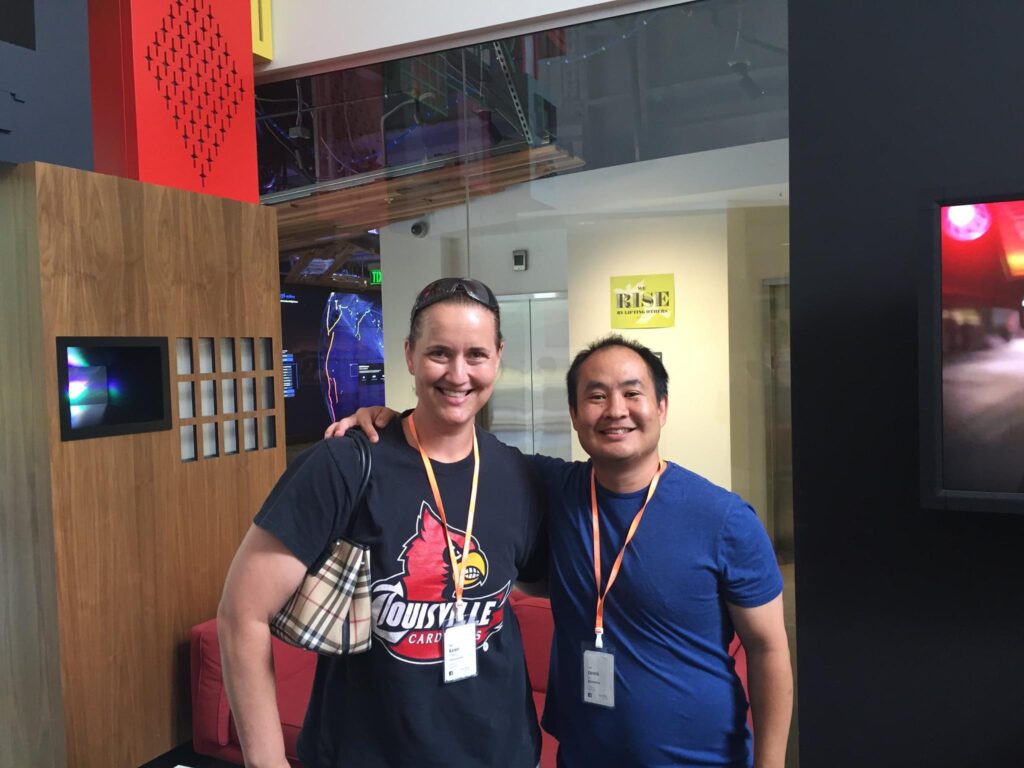
She’d never been to Facebook before, and she flew into San Francisco, and we spent a few days touring LinkedIn’s headquarters,
We stopped at Facebook and introduced her to a lot of friends. It was a great experience. And it’s way better than me saying, hey, I’m going to create a lot of jobs by hiring young adults that are still in college because I have this amazing program where a lot of people are making a lot of money. Or it’s Dr. Karen Freeberg and she’s talking about this.
So your credibility comes from whoever’s most relevant, not necessarily who the highest authority person is.
You Build a Brand by Co-creating Content With Other People
So my whole brand is built upon co-created content with these other people, and I’m actively managing these relationships. It’s not just I meet them, you know, whatever, every 3 years, I take a photo at the conference. They don’t know who I am. I know who these people are. We hung out with some of them.
And those tie to topics. So, Dr Karen Freeberg is probably the top educator among college professors in social media, PR, and public relations. She’s got a best-selling book. She speaks at all the conferences. And so she’s constantly saying great things about me. Not because I bought her gifts and things like that, but because we believe in the same thing.
If your why is clear, which at a certain point goes beyond, I want to make enough money to do these things for myself. Now, I want to give back. I want to help other people who also have Crohn’s disease or, you know, whatever it might be. I want to help children in this particular situation you want to give back.
That’s going to tidy the topics you have that will naturally connect you with other people who are authoritative in those things where you are co-creating content, not because you’re trying to leverage that the guy was the CEO of American Airlines. But because you believe that, for example, Ali and I believe that travel is how we democratize the world because when you meet people for the first time, you get a real sense of how they are instead of just like whatever the media tells you, you know, I’m not left or right or whatever it is.
For example, people have an idea of Pakistan. They think of, like, bombs, evil people and desert and all that, and, here we’re hanging out, having a good time, staying at people’s houses, super friendly, just tons and tons of stuff.
There’s me and Rehan. Rehan is probably the second or third most famous person in Pakistan, and my personal brand is growing because of him.
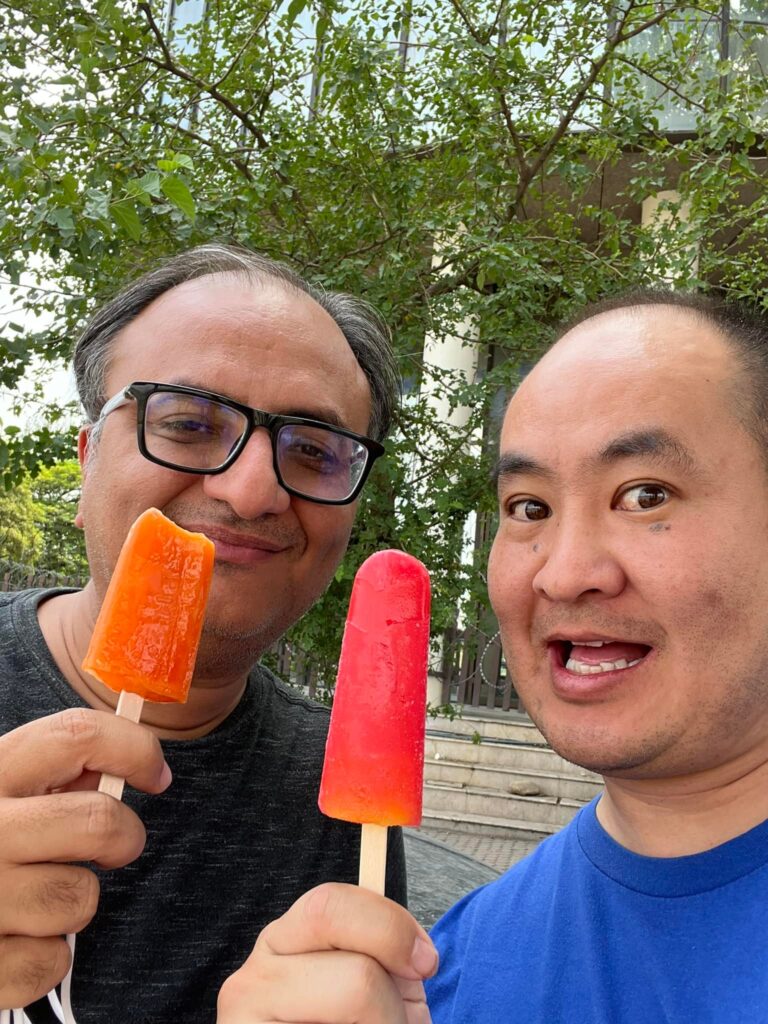
We’re hanging out with this guy. How cool is that? It’s probably not a great example, but you know, Kamala Harris or something. That’s the equivalent. Right?
And this guy’s the number one SEO digital-marketing guy in Pakistan. And he considers me his mentor. How cool is that?

This is another guy who is like McDonald’s and Burger King.
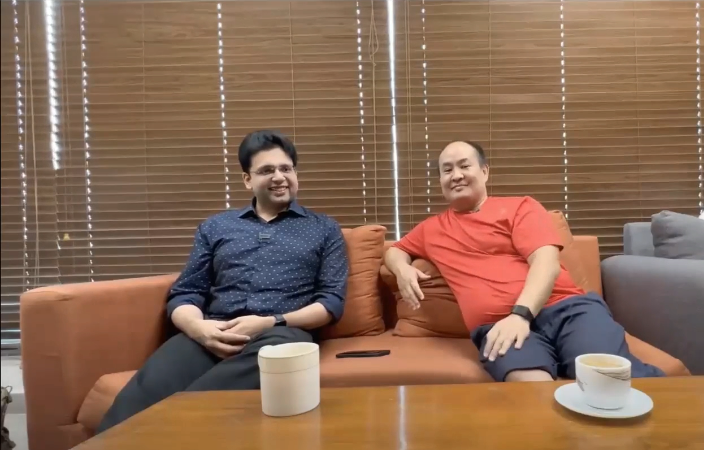
We talk about how he’s creating jobs. And then towards the end of it, we say, you know what, we should partner. And we sign a memorandum of understanding about how we are co-creating training together and all the training we’ve created.
He has a team of people who are going to translate it into Urdu, which is the language they have over there. Right? So, what does he do? He takes the content that we’ve been creating together, and then he posts it to Facebook and Instagram to his YouTube to all these places. So now these 1. 3M students know about me.
And now I’m sharing about him with all of our audiences here.
That’s the full theme circle of what I want to show you guys here. And we struggle with this too. Can you imagine working at Apple and someone comes up to you and ask, hey, can you tell me about the iPhone? And you say, what’s an iPhone? How would you feel about that? But that’s what we have going on.
We have people on our team who don’t even know what a LIGHTHOUSE is, who don’t even know what the Dollar a Day strategy is, and who don’t know the things that we teach.
I don’t care how good they are at WordPress or SEO or whatever; they have to first understand the brand, which means the goals, content, and targeting.
This is something I’m saying out of just frustration because it’s a very recent thing that happened today and is ongoing, but I want all of you guys to avoid the pain that we’ve had from people who don’t believe in the brand.
Eventually, when we got chewed out for this yesterday in our Daryl Isaac state, we had people posting on these attorney channels, and they didn’t understand that Darryl and his father, Sheldon, started 30 years ago, and there’s a whole mission behind that. It wasn’t just like these two guys who started a law firm. No, there was a whole deeper story, and so they were just posting stuff that had grammatical errors, was poorly written, and all that. And it wasn’t because of the grammatical errors.
The grammatical errors were just symptomatic of the fact that the people working on Darryl Isaacs don’t care about Darryl Isaacs. It just shows through. It’s not that we’re using Grammarly or ChatGPT to correct grammar or rewrite something into actual sentences on our location service pages. It’s that whoever is working on those location service pages doesn’t give a damn about Daryl Isaacs.
No matter how much we talk about Daryl Isaacs and how he’s the hammer, he wants to get back. He had an accident in 2015 where he nearly died and asked if he could walk again because the doctor said he couldn’t. If he walked again, he would dedicate his life. To help other people and the way he runs his company, whoever was working on those pages that generated the garbage, doesn’t know about Daryl Isaacs.
And then when Daryl called me up two weeks ago, and I don’t want to say he’d shoot me out, but he told me, dude, you and I are good friends, but you got to improve your quality. Right? We just need to up our level here. Right? And I need people who are on it, and we just can’t afford these sorts of mistakes.
And he said it in a much nicer way than I could have said it, but that’s basically what he said.
And so when you see me saying things like, hey, let’s follow, learn, do, teach. It’s not because I’m mad. It’s not because I’m trying to be critical. It’s that the people working on the brand think, well, I just need to work on my Photoshop skills and Adobe Illustrator; I’m just a designer.
No, the number one thing is you understand the brand. You always start with goals, content, and targeting. We have an issue with an engineer who keeps making this VA mistake because he refuses to understand goals, content, and targeting.
So that is why, to sum it up, you should never work on your own personal brand.
Because it’s what other people have to say about you; if you have a clear mission that ties into topics that attract the right people into your life, these other people will be bigger than you. These other people will have connections and angles that you don’t have because they have that kind of authority.
When you have a common mission, like ours, creating jobs, these other people want to work with you. Wouldn’t you agree that with Dr. Karen Freeburg, the quality of what we’re doing is way better than if I were to pay her 100 an hour? Dr. Karen Freeburg advises us, and she’s a busy woman doing many things, creating curriculums and teaching all these professors.
Why would she want to spend time with us? I couldn’t even pay her enough money. It’s because we share a common belief, and that common belief eventually bubbles up into content that’s so real, high quality, and authentic.
You can’t fake that.
So, our personal brands are not like, look at me, I’m famous. I’m speaking in front of 30,000 people. I’m trying to help other people, and I want to help them. We want to help people overcome this particular kind of problem. And when you see it as you are a surgeon and you’re helping as many people as you can, you’re not a salesperson.
You’re the emergency room surgeon, which is completely different than half off, if you buy now in the next 30 minutes or all that kind of sales, fear, uncertainty, doubt, those kinds of techniques.
So our branding strategy is to be clear on your why and your connections, demonstrate that you’ve done something yourself, and only then will the Content Factory work for you. It’s not because we have a particular format. It’s not because I was on TV or anything like that. It’s because I had a clear why. And that’s how I got my blue check marks 15 years ago. The success that we have now is not because I have a blue check mark.
It’s because of those things that we’ve done that I got the blue check mark.
